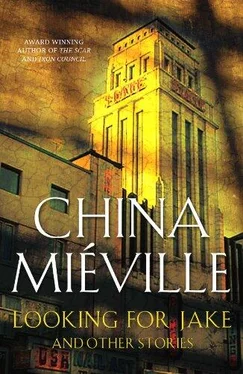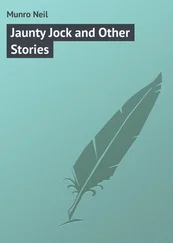We never knew—or I was not told—quite what happened, how we came free. I know some things.
The Fish of the Mirror was the mastermind. It was its genius that broke us all out, rather than only a misfit few renegades who had to be spies, and are now reminders.
Light falls as light always fell. It scatters. It rebounds from what it touches. But as it touches off tighter, where its integrity is more sustained, and more sustained, the key turns, until where there is sheen, light transmutes, and makes a door.
Pushing through the mirror was something, was a pleasure you can’t imagine. All the patchogues say so.
A complete feeling. Something very whole. But it is not the mirror that reflected: it was the tain. That is where the imagos were. In the tain. Coming through the mirror was a one-way trip: we broke the glass as we passed. We showered those whose forms were our prisons with jagged splinters as we arrived, so that they were bleeding and crying out before we touched them.
When we looked up, all exhilarated from our liberation struggle, we turned and saw the door was closed, that only a fringe of glass and thin silver was left at the edges of what had been a mirror.
Now, all mirrors are open doors, always. The imagos, those who aren’t trapped in your bodies, can pass through glass without harm to it or them: they can slip into the tain. But not us. If we push into the tain we will break it.
There are other doorways. Mirrors that are not blocked to us with a skin of glass: but they are hard to find. Sheets of chrome or aluminum so pressed, so polished that scuffs don’t disfigure them, that they are portals, with the tain open to the air. I do not know where any are.
Coming over this little hill, though, I know why I’ve come here. I have come here, I’ve found this place so that I can go home.
The moon rises over the little pond before me, and the pond is absolutely, unnaturally still. I am almost afraid to breathe (but trapped in this body, I must). The trees that brought me here circle the water, showing it to me, and I know that in the days before the war I would have looked down and seen the twin of each of those trees. I look down now, imagining it, and I’m staring into water so still, lit by moonlight so absolutely pure, it’s like a little god.
I want to go home. The bondage is broken: there’s nothing tethering the other side anymore. It’s undiscovered now, a continent absolutely strange. What forms it might take. After centuries of mocking-bird topography, the tain has been freed. It might be any shape now: the thought of that makes me hanker. It could be anything. I look hard, staring through the darkness of the doorway, through the water, and I swear I can see through, past the veil that obscures, through to the other side, and I swear that I can see trees.
If I’m gentle, if I’m quick, if no wind comes to disrupt this perfect tain, then I can go, I can go home. My passing will disrupt it but I’ll be gone. I need time, or space, or something, to work out why I do not want to be with my imago kin any more. I’ll go where it’s untethered, where it can all be different.
In my bare feet I run down this little grass angle, down this scrubby incline, picking up my feet so as not to send dirt or boscage into the water, not to disrupt it, to disrupt it only with me, and I run and leap. I am poised. I am poised, and now I am descending, and as the water, as the tain comes up at me, I can see through it, I can see through it faintly, to what I swear is a rising crater of dirt and grass, to trees, to a moon and clouds, to everything that is here around me, everything but me. I am falling toward the tain, but no one is falling toward me.
The soldiers were to launch their attack in the small hours. They were still not sure of what it was Sholl wanted to do. They only knew that he had a plan, and that they had to get him inside. Sholl knew that he could not think about it too hard, about what the men and women were doing: the faith they had and what they were prepared to do, for him, without ever knowing his story.
He spent the hours before their assault talking quietly to the officer. Sholl told him that he did not have to come, or bring his troops. Sholl was ready to go, and the soldiers could wait for him. Sholl meant it: he would have been sincerely relieved had his companions stayed where they were, refused to come one step farther with him. But he was not surprised by the officer’s refusal, and he greeted it with as much resignation as sadness.
The soldiers performed their routines, like tics—checking and rechecking, strapping ammunition, sighting along rifles—and Sholl stood in the darkness of the shop in which they waited and stared across at their target. He did not know the morals or rules of the new terrain: he suspected that they were unknowable.
Still, he understood a kind of logic to the Fish of the Mirror’s choice of lair, and the fact that he understood it did not convince Sholl that it was therefore wrong.
It could be a kind of neurotic, a kind of masochistic pleasure. To be surrounded by the evidence of your imprisoning: to roam corridors like time machines, in which the differing shapes and colours of your jailers from a thousand years ago stretched up to those of yesterday, and your pleasure derived from the fact that you passed them, and remembered them, but were free. Making a home in the shell of a jail. It was bitter, but it made a kind of sense.
The Fish of the Mirror lived in the British Museum. At its heart, the vampire had told Sholl. Surrounded by the detritus of men and women from the ancient Americas, from the East, from old Greece and Egypt.
Material culture that the imagos had been forced to make, wherever it was reflected. The Fish of the Mirror lived in corridors made of time, of incarceration, and it moved through them, quite free.
He did not know what else was inside. Perhaps nothing. There was no movement on the white steps, on the lawn before the building. The gates were open.
“Let me go alone,” whispered Sholl with sudden, absolute conviction.
When he said it loud enough to be heard they argued with him, at first respectfully but soon with great heat.
“You cannot go in there alone!” the commander yelled at him, and Sholl bellowed that he would go where he wanted, alone or not. The soldiers marshalled moral arguments against him —it’s not your fucking fight, we need this, you don’t get to order us— and all he could do was play the messianic role they had given him. He spoke obliquely and hinted at things he could not tell them. He spoke with righteous anger. He felt contempt for himself, for this act, but he felt pride under that, because he was trying to save them. When he finally bellowed at them that he would go alone, he used all the authority they had ceded to him, and they were shocked and silent.
Sholl walked away from them, stepped out of the broken window of the shop and stood alone in the street, in full view, without weapons. He showed the soldiers what only he could do.
It was deep night: the moon silvered him. Sholl turned back to his companions in the darkness of the shop and muttered something to them: it was meant to be conciliatory and warm, but he saw only betrayal on their faces. You don’t understand, he thought, and raised his hands in an attitude of the most vague, the most uncertain benediction, then turned and walked away quickly, crossing Russell Street, passing through the threshold of the museum’s gates and onto its drive, past the lawn where the ruins of public sculptures were bruised with verdigris. He was in the grounds, he was in, and he walked faster toward the steps and the doors that were open and very dark. He had never been so afraid or excited.
Читать дальше












